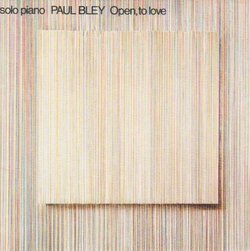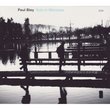| All Artists: Paul Bley Title: Open to Love (Shm) Members Wishing: 3 Total Copies: 0 Label: Universal Japan Release Date: 10/8/2008 Album Type: Original recording remastered, Import Genres: Jazz, Special Interest, Pop Style: Avant Garde & Free Jazz Number of Discs: 1 SwapaCD Credits: 1 |
Search - Paul Bley :: Open to Love (Shm)
 | Paul Bley Open to Love (Shm) Genres: Jazz, Special Interest, Pop
This is Paul Bley's first solo recording from 1972, and it marked a significant new direction in solo piano. He had been using synthesizers extensively at the time, and he wanted to achieve the same kind of sustain in acou... more » |
Larger Image |
CD DetailsSynopsis
Amazon.com This is Paul Bley's first solo recording from 1972, and it marked a significant new direction in solo piano. He had been using synthesizers extensively at the time, and he wanted to achieve the same kind of sustain in acoustic music. Using close miking and reverb, he got long delays that magnified the piano's sustain while leaving the instrument's harmonics intact. His increasingly spare style further enhances the effect, creating rich musical life in the spaces he leaves. The version of Carla Bley's oft-recorded "Ida Lupino" is a classic, "Harlem" is slow and refined barrelhouse, and Annette Peacock's title tune is a sonorous, emotionally evocative work. In Bley's hands, even anxiety is beautiful, and this CD's movements through the moody and serene seem to magnify quiet. --Stuart Broomer Similar CDs
|
CD ReviewsA classic work by a trmendously influential performer 03/16/2000 (5 out of 5 stars) "This is a fantastic CD. Recorded in 1972, it includes solo performances of songs Bley had previously recorded and would record again ("Fragments", released in the 80's, includes new interpretations of three of the songs heard here). There are strong similarities to Keith Jarrett's solo work on this CD (it seems probable Jarrett was strongly influenced by Bley). As to the comment another customer made about Bley "not being worthy to fold George Winton's socks", just because they both have released solo piano discs does not mean they have to have the same objectives. Bley has never set out to be a relaxing new age performer, but his work has a beauty and depth of tremendous value for many listeners." Solo Bley Christopher Forbes | Brooklyn,, NY | 08/29/2002 (5 out of 5 stars) "This is Bley's first solo album, recorded at around the same time as Keith Jarret recorded Facing You. The comparison is more apt than might first be suspected. Jarrett and Bley both share an uncanny ability to be introspective on the keyboard, but where Jarrett can be exuberant and at times, even a bit vulgar, Bley is always searching and elegant. Bley's work is never about display for it's own sake, but always in deeper service to the music. (Jarrett's music is also like this at his best, but Jarrett records too much and not all of his solo work is of the same quality.) Bley's version of Ida Lupino is one that I would consider standard, surpassing even that of Gary Burton. He is faithful in the extreme to the composition, but then uses it as a source of development rather than just chord changes. This is true throughout the album. Bley's approach to improvisation is melodic first, with stark spare harmonic fragments in the accompaniment and occasional contrapuntal lines. But the improvisations are structured around melodic fragments contained in the compositions themselves, which give the performances a cohesiveness not found in much free-form playing. This is not music that should be compared to New Age hacks like George Winston. They are not even in the same league. Winston is a wannabe, Bley is the real deal...requiring more out of a listener than some people obviously want to give. Hang in there with this though. The pleasures are enormous." Try it, you'll like it. 04/11/1999 (5 out of 5 stars) "One of my all time favorite jazz CDs. There is no better introduction to Bley's work; this CD is perfect example of how a performer with a distinctly avant-garde style can still capture the type of emotional resonances and accessability that one associates with a more "mainstream" artist like Bill Evans or Brad Mehldau."
|

 Track Listings (7) - Disc #1
Track Listings (7) - Disc #1
